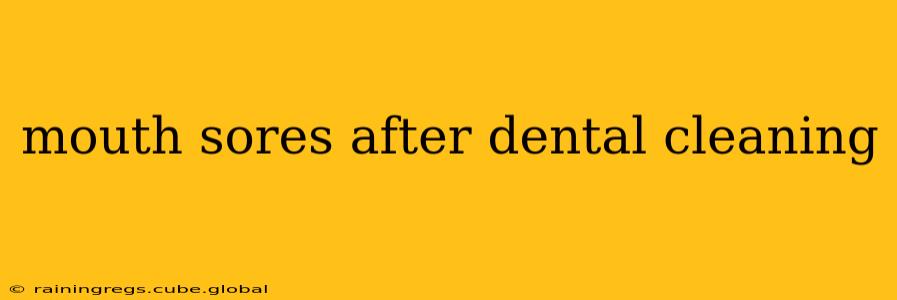Experiencing mouth sores after a dental cleaning can be uncomfortable and frustrating. While it's not uncommon, understanding the potential causes, effective treatments, and preventative measures is crucial for managing this issue. This comprehensive guide will address common concerns and provide valuable information to help you navigate this experience.
What Causes Mouth Sores After a Dental Cleaning?
Several factors can contribute to developing mouth sores after a dental cleaning. The most common reasons include:
-
Minor Trauma: The cleaning process, particularly scaling and polishing, can sometimes cause minor trauma to the soft tissues in your mouth. This irritation can manifest as small, superficial ulcers or canker sores. The instruments used, while designed to be gentle, can inadvertently scrape or irritate sensitive areas.
-
Allergic Reaction: While rare, some individuals might experience an allergic reaction to certain components of the cleaning solutions or polishing pastes used during the procedure. This can lead to inflammation and the development of sores.
-
Infection: Although less frequent, an infection can occur if the cleaning process inadvertently introduces bacteria into an open wound or compromised area in the mouth. This is less common with proper sterilization techniques employed by dental professionals.
-
Dry Mouth (Xerostomia): Reduced saliva production can leave the oral mucosa more vulnerable to irritation and the development of sores. This can be exacerbated by certain medications or medical conditions, and the cleaning itself can temporarily reduce saliva flow.
-
Existing Conditions: Individuals with pre-existing conditions like aphthous ulcers (canker sores) may experience an exacerbation of these sores following a dental cleaning due to the irritation of the procedure.
How Long Do Mouth Sores After Dental Cleaning Last?
The duration of mouth sores after a dental cleaning varies depending on their severity and the underlying cause. Most minor sores resulting from trauma heal within a few days to a week. However, more persistent or severe sores may require longer healing times, possibly up to two weeks or more. If sores persist beyond two weeks, it’s vital to consult your dentist.
How to Treat Mouth Sores After Dental Cleaning?
Treatment depends on the severity and cause of the sores. Many minor sores resolve on their own with basic home care:
-
Rinsing: Gently rinsing your mouth with warm salt water (1/4 teaspoon salt dissolved in 8 ounces of warm water) several times a day can help soothe irritation and promote healing.
-
Over-the-counter medications: Pain relievers like ibuprofen or acetaminophen can help manage any discomfort. Topical anesthetics such as Orabase or benzocaine gels can provide temporary pain relief directly to the sores.
-
Soft Foods: Opt for soft, bland foods that avoid further irritating the sores. Avoid spicy, acidic, or hard foods during the healing process.
Can You Get a Mouth Sore from Dental Cleaning?
Yes, it's possible to develop a mouth sore after a dental cleaning. While uncommon, it's a known potential side effect. The good news is that most sores are minor and resolve quickly with simple home care.
What to Do if Mouth Sores Persist After Dental Cleaning?
If your mouth sores don't improve or worsen after a week, or if you experience significant pain or swelling, contact your dentist immediately. Persistent sores could indicate a more serious underlying issue that needs professional attention.
Preventing Mouth Sores After Dental Cleaning
While you can't always prevent mouth sores entirely, you can take steps to minimize the risk:
-
Hydration: Staying well-hydrated helps maintain saliva production, which plays a crucial role in oral health and healing.
-
Gentle Brushing: Use a soft-bristled toothbrush and gentle brushing techniques to avoid irritating your gums.
-
Healthy Diet: A balanced diet supports overall oral health, including healing.
This information is for general knowledge and does not constitute medical advice. Always consult with a dental professional for any concerns regarding your oral health. They can provide a proper diagnosis and recommend the most appropriate treatment plan.
